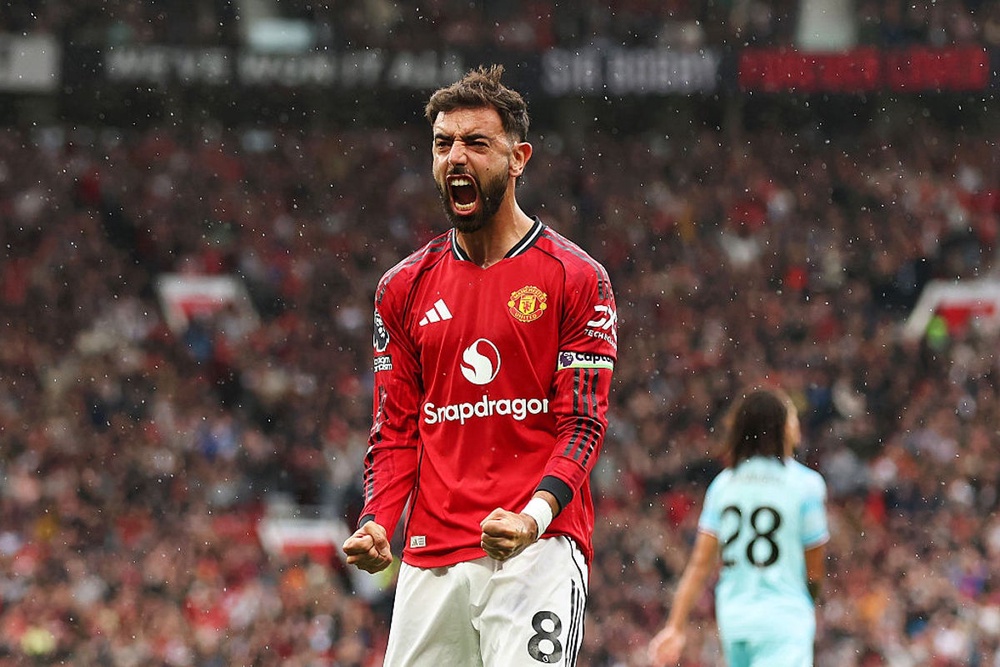Subtotal $0.00
Late drama seals victory
Manchester United’s campaign received a dramatic boost as Bruno Fernandes converted a dramatic 96th-minute penalty to seal a 3-2 victory over Burnley. The fixture, described by United manager Ruben Amorim as a must-win encounter, kept the pressure firmly on the players and underscored the clinical nerve the side needed to find three points in a fixture that refused to yield easily. Throughout the 90 minutes, United showed resilience, weathering spells of Burnley pressure and staying within touching distance on the scoreboard as the drama built to a crescendo in stoppage time. Fernandes, who has often acted as the team’s go-to scorer in tight moments, delivered when it mattered most—stepping up from the spot after a late handball in the box to convert and spark jubilant scenes inside the stadium. The late winner not only secured all three points but also reminded everyone watching that United possess a fighting spirit even when the fixtures pile up and the margins are slim.
The match began with Burnley adopting a high-intensity approach, forcing United into moments of discomfort as they leaked chances and tested the visitors’ back line. United weathered those early storms, found a foothold in the middle of the park, and began to edge the tie with a combination of pace on the flanks and measured, patient build‑ups through the middle. As the game progressed, it became clear that this would be a test of nerve as much as skill, with the final 10 minutes promising to decide the outcome long before Fernandes’ late intervention.
Amorim’s ‘must-win’ message
In the build-up to kickoff, Amorim spoke openly about the need to win and the importance of delivering under pressure. His message was simple: this is a match that defines the direction of the season, not just the points tally, and it requires a collective response from every member of the squad. That sentiment translated onto the pitch as United played with greater cohesion, focus, and urgency than in recent glimpses of the campaign. The manager’s insistence on turning pressure into purposeful action appeared to energise the group, with a clear plan to defend resolutely when Burnley pressed and to strike decisively when opportunities presented themselves in transition.
After the final whistle, Amorim emphasised that the win was deserved, praising the squadra for sustaining intensity across the 90 minutes and then squeezing out a result in stoppage time. He acknowledged the lapses that allowed Burnley back into the contest but insisted that the correct response to those moments is to trust the process, protect the ball in dangerous areas, and maintain composure when the clock becomes a weapon. The victory thus carried significance beyond the three points: it signalled a shift in mindset, a willingness to back players in critical situations, and a reminder that in a crowded schedule, resilience can be a differentiator.
Key performers and tactical notes
Bruno Fernandes again starred as the pivotal figure for United, with his calm and precision from the penalty spot delivering the decisive moment at the end. The focus keyword, Bruno Fernandes late penalty against Burnley, encapsulates the match’s defining moment and will be a key search term for fans and analysts digesting this triumph. Fernandes has long been the club’s go-to option when the clock is winding down and the stakes are high, and this instance reinforced his status as the team’s most reliable late-game clinical finisher.
Beyond Fernandes, several other performers deserve credit for contributing to United’s hard-fought win. The back line, under sustained pressure in the latter stages, managed to maintain organisation and discipline when Burnley sought to exploit gaps, while the midfield anchored the team’s shape, offering balance between defensive duties and the gradual build-up of attacks. The midfield press and compact shape limited the visitors’ opportunities to break through in key areas, forcing Burnley to resort to speculative efforts from distance rather than clear-cut chances in the box.
From a tactical perspective, United’s approach blended defensive solidity with a pragmatic, goal-oriented attack. The team showed willingness to press high when transition opportunities appeared, but also demonstrated patience in protecting fragile moments against Burnley’s momentum. This balance was crucial in keeping the scoreline within reach for the late drama to unfold. The substitutions, too, hinted at a manager prepared to trust squad depth—an important attribute when a congested calendar tests both energy levels and consistency.
In terms of individual performances, the defence absorbed pressure and refused to wilt under Burnley’s attempts to draw level after United had taken a lead earlier in the game. The approach was pragmatic rather than flamboyant, prioritising clean lines, disciplined marking, and timely clearances. The forwards, while not always breaking through with a decisive goal before the late penalty, contributed with intelligent runs and smart link-up play, maintaining the intensity required to keep Burnley’s defence honest and ensuring that United remained an attacking threat up to the final whistle.
Defensive shape and midfield balance
Several talking points emerged from the tactical setup. The defensive line maintained a steady rhythm, with a focus on compact spacing and disciplined positioning to thwart Burnley’s forward runs. In midfield, runners from the central areas offered a mix of distribution and aggression, helping to sustain pressure on Burnley’s midfields and limiting the visitors’ ability to drive through the heart of the pitch. When the ball went wide, United’s wingers provided width and threat, while the central midfielders supplied the necessary support to the back four and snuffed out quick counter-attacks before they could cause real harm.
From a set-piece perspective, United’s organization during dangerous moments was pivotal. Burnley’s physical presence posed a real challenge, but the home side’s preparation and focus gave them the edge in key moments that mattered, culminating in Fernandes’ late intervention. The balance between attack and defence is an area Amorim would have studied closely after the match, and the performance suggests a willingness to refine the balance further as the season progresses.
Implications for United going forward
The late, dramatic nature of the victory will inevitably shape how United approach the rest of the campaign. Three key themes emerge from this performance and result: resilience under pressure, squad depth, and tactical adaptability. The ability to convert a late penalty to secure a win demonstrates not only technical proficiency in high-stakes moments but also a mental resilience that the manager has been calling for since the season began. In years past, such scenarios could slip away; this time, United showed the nerve to finish with conviction, a trait that can lift confidence in training and competitive environments alike.
Squad depth is another meaningful takeaway. The manager’s readiness to lean on a wider pool of players in the closing stages of the match sends a message about the collective nature of United’s pursuit of results. It also raises questions about how the squad will cope with a relentless schedule, as repeated fixtures demand rotation without a drop in intensity. The performance hints that Amorim is building a squad capable of sustaining pressure across multiple competitions, with Fernandes playing a pivotal role as a leader who can shape outcomes in the most demanding moments.
Looking ahead, there are tactical considerations United must navigate. Burnley’s pressure illustrated how quick transitions and mid-field battles can swing a game in their favor, urging United to anticipate and mitigate such scenarios more effectively. The manager will be aware of the need to maintain defensive compactness during rapid transitions while preserving the forward impetus that Fernandes and others provide in the final third. There is also an ongoing conversation about the balance between patience in possession and the willingness to take decisive risks when opportunities arise, particularly in tight matches where a single moment can redefine the result.
Another implication concerns the club’s public narrative. Critics often question whether United can close out difficult fixtures; this result provides a counter-narrative that resilience and a fearless approach in the dying minutes can yield the needed points. It also sets a benchmark for the culture Amorim is trying to cultivate—one where the team believes in its ability to overcome adversity, trust in the process, and deliver in moments that test the collective character of the squad.
In summary, the win over Burnley — sealed by Bruno Fernandes late penalty against Burnley — is more than a three-point haul. It is a statement of intent about the direction of the season and a demonstration of how United plan to navigate a congested calendar with resilience, depth, and tactical flexibility. If the team can maintain this momentum, there is grounds for optimism about the path forward, with Fernandes continuing to be the catalyst in moments when results hinge on a single act of execution. The road ahead will be challenging, but the signs from this match are that United are developing the mental and strategic fortitude necessary to compete at the highest levels, even when the margins prove razor-thin and the pressure is unyielding.
















